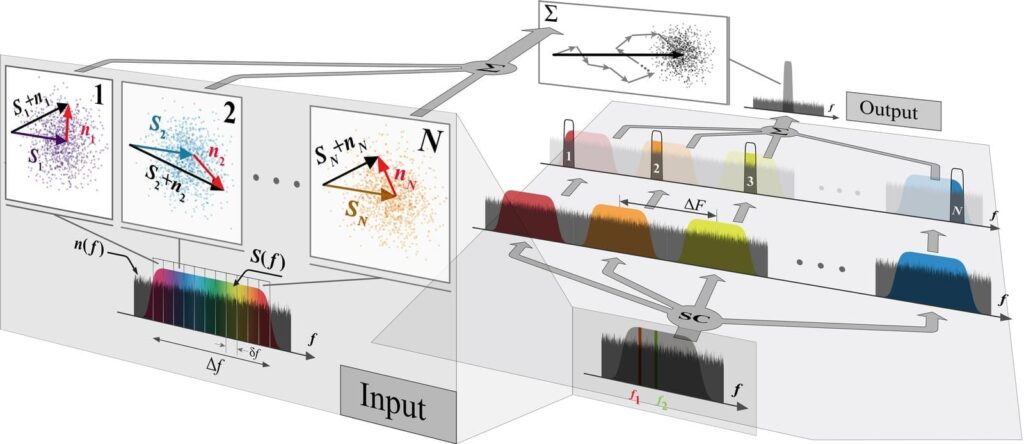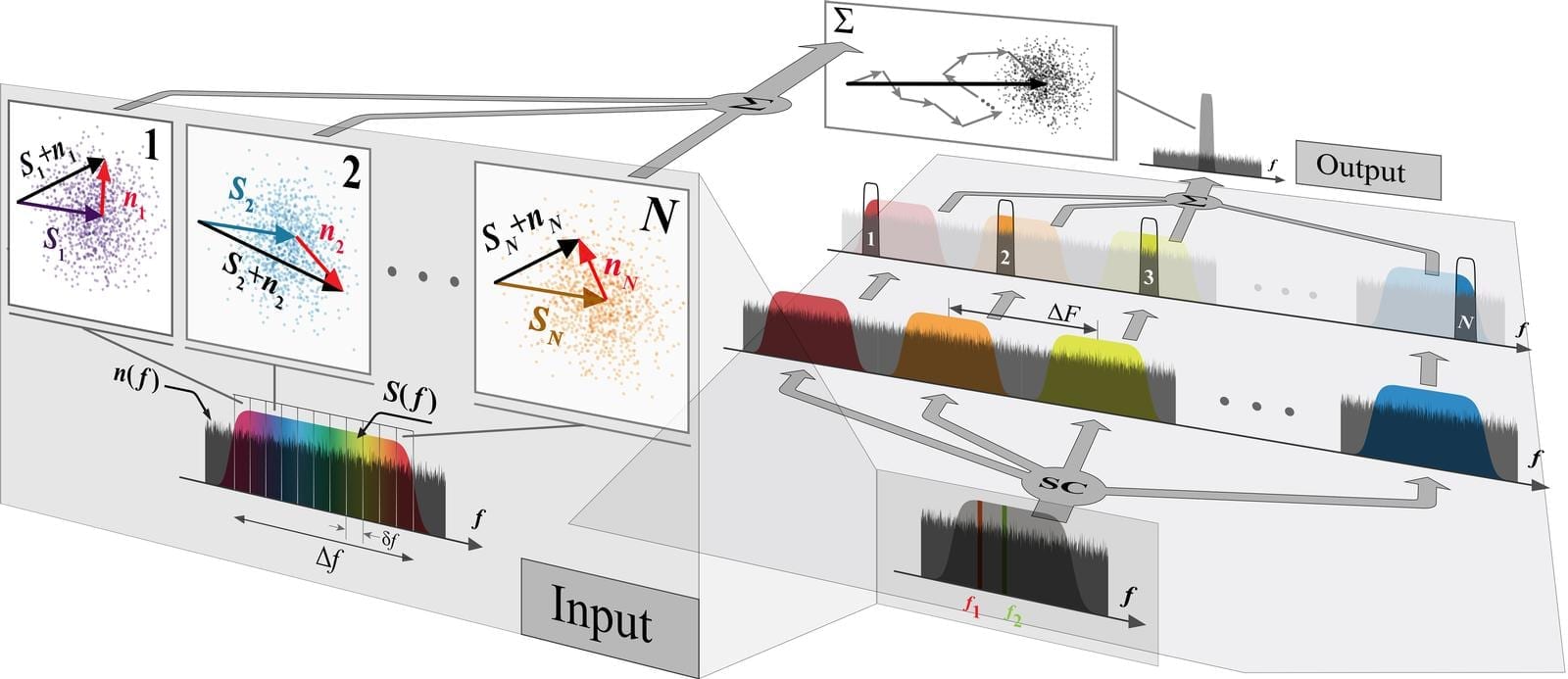
Electrical engineers at the University of California, San Diego developed a receiver that can detect a weak, fast, randomly occurring signal.
The study, published in the Dec. 11 issue of Science, lays the groundwork for a new class of highly sensitive communication receivers and scientific instruments that can extract faint, non-repetitive signals from noise. The advance has applications in secure communication, electronic warfare, signal intelligence, remote sensing, astronomy and spectroscopy.
The research is motivated by a long-standing need to capture random, singly-occurring phenomena in nature and in communications. An example of these includes the spontaneous decay of a molecule, an event that emits a single noisy signal and therefore eludes detection by conventional methods. Because a standard detector must repeat measurements of the event multiple times to confirm its existence, it prevents, in principle, the capture of a random, non-repetitive event. Another limitation is that the capture of a fast event requires an equally fast detector.
To overcome the limitations of conventional detection methods, UC San Diego researchers developed a spectral-cloning receiver that works by replicating the received noisy signal to generate multiple spectral (colored) copies, and then combines these copies to reveal the existence of the signal within the noise.
“With the new receiver, it is now possible, at least in principle, to capture an ephemeral, non-repeating signal and observe fast, sparsely occurring natural or artificial phenomena—that would otherwise be invisible to us—over a long period of time, using a slow detector,” said Stojan Radic, an electrical engineering professor in the Jacobs School of Engineering at UC San Diego and senior author of the study
In the Science paper, researchers report that the spectral-cloning receiver they developed “can potentially intercept communication signals that are presently considered secure.” These signals are based on singly-occurring bursts, which disappear before another measurement can be taken to separate noise.
Radic also noted that the receiver could enable communication at a longer distance and with higher security. For example, it would be possible to bury the communication channel in noise and still detect it using the new receiver, while being well below the sensitivity threshold of conventional detectors.
The new receiver physics can be compared to a “temporal microscope”: it can see a very fast, faint signal while observing over a much larger time interval. However, while an ordinary microscope cannot eliminate surrounding image noise, the new receiver can differentiate between the noise and the signal fields.
Read more: Noise can’t hide weak signals from this new receiver
The Latest on: Spectral cloning receiver
[google_news title=”” keyword=”Spectral cloning receiver” num_posts=”10″ blurb_length=”0″ show_thumb=”left”]
via Google News
The Latest on: Spectral cloning receiver
- Best disk cloning software of 2024on May 7, 2024 at 2:12 am
The best disk cloning software, er, clones your disks - solid state or hard disk drives - to serve as physical backups for files and folders (as with traditional backup and cloud backup software ...
- OpenAI reveals impressive voice cloning model, and it's scary goodon March 30, 2024 at 7:06 am
Dubbed Voice Engine, this model is quite small, which makes its audio cloning capabilities all the more impressive. OpenAI has been working on this project since at least 2022, and it's the ...
- Animals: Receiveron February 26, 2024 at 4:12 pm
In Coney Island, N. Y., pending settlement of a suit Mrs. Little Docen last week was appointed receiver of her husband’s property listed as follows: four two-legged dogs, two six-legged sheep ...
- The Best AirPlay Receiverson December 28, 2023 at 7:14 pm
It’s a 5.2-channel receiver with Apple AirPlay 2 compatibility to stream your favorite tunes from your iPhone. The AVR-S670H also features Audyssey MultEQ room-correction tech to auto-calibrate ...
- Building A Receiver With The ProgRock2 Programmable Crystalon April 28, 2023 at 8:16 pm
[Q26] decided to use the ProgRock2 “programmable crystal” to build a receiver that could tune multiple frequencies without the usual traditional tuning circuitry. The ProgRock2 is designed ...
- Cloningon June 27, 2022 at 5:01 pm
But cloning could offer an answer. Animal cloning is becoming more common – and cloning extinct species could be on the horizon. Could parks and zoos for these creatures be round the corner?
- Embryo splitting caught in cloning controversyon December 9, 2021 at 7:23 pm
But this technique -- called embryo splitting -- isn't being used because of all the recent hubbub over cloning. Embryo splitting is just what its name suggests. A new, identical embryo is split ...
- An Inexpensive FM Receiver For The Raspberry Pion September 7, 2021 at 8:04 pm
[Dilshan Jayakody] recently documented his experience in designing and building an inexpensive FM Stereo Receiver for the Pi platform, and the results are impressive. Quite a few FM receiver ...
- On Human Cloning: Three Viewson August 15, 2020 at 9:12 pm
Could human beings now begin making carbon copies of themselves? If so, will those with the means use cloning to essentially cheat mortality? Could a form of the eugenics espoused by the Nazis now ...
- Cloning debateson March 26, 2019 at 3:22 pm
Whereas human cloning has been debated by politicians and ethicists largely in terms of its effects on society, children and our sense of personal identity, its deeper challenges lie in the realm ...
via Bing News











